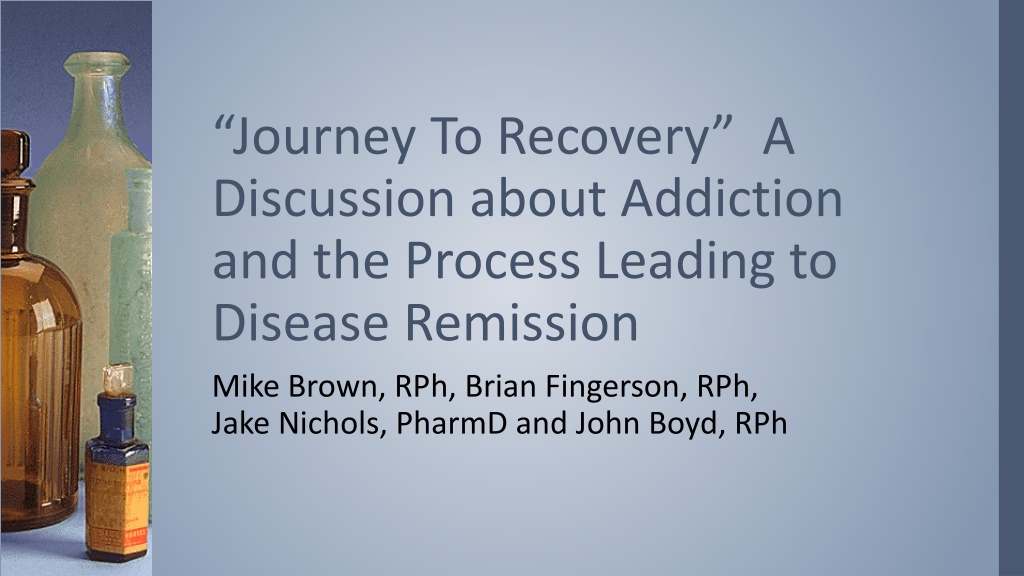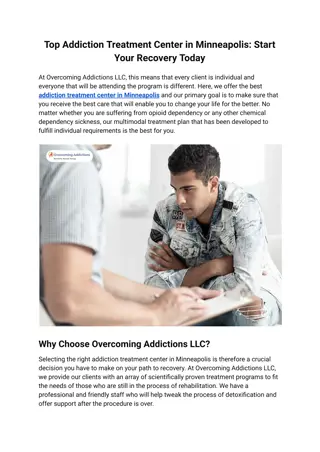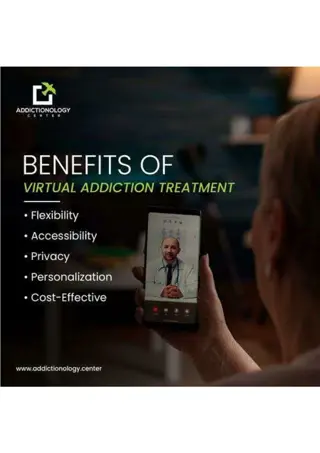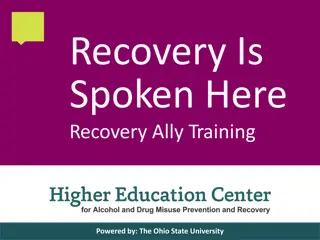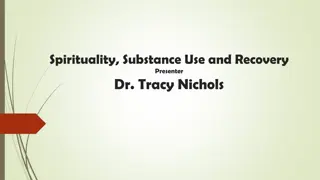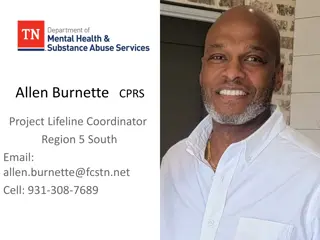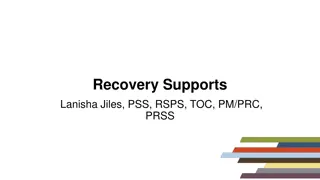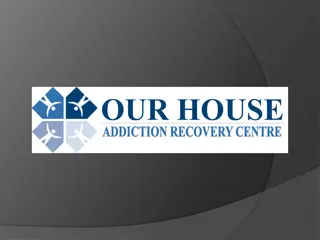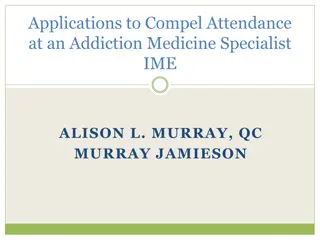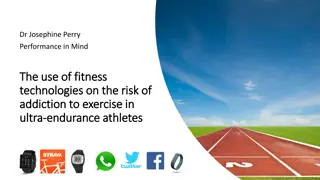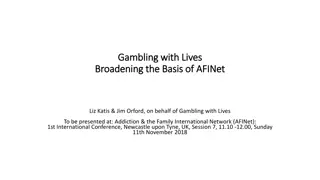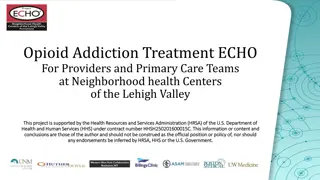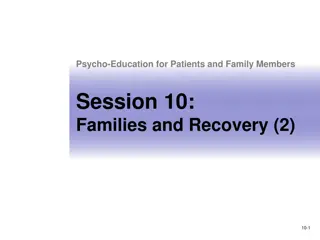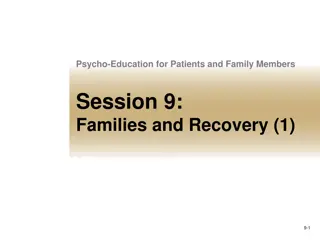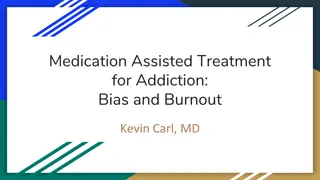Understanding Addiction and the Journey to Recovery
This discussion delves into addiction as a progressive disease, the process of recovery, characteristics of addicted healthcare professionals, and the progression of substance use disorders. Speakers provide insights on recovery definitions, short-term vs. long-term recovery attributes, and successful recovery characteristics. Key topics include the disease progression model and factors influencing addiction.
Download Presentation

Please find below an Image/Link to download the presentation.
The content on the website is provided AS IS for your information and personal use only. It may not be sold, licensed, or shared on other websites without obtaining consent from the author. Download presentation by click this link. If you encounter any issues during the download, it is possible that the publisher has removed the file from their server.
E N D
Presentation Transcript
Journey To Recovery A Discussion about Addiction and the Process Leading to Disease Remission Mike Brown, RPh, Brian Fingerson, RPh, Jake Nichols, PharmD and John Boyd, RPh
Disclosures The following speakers have disclosed no actual or potential conflicts of interest in relation to his presentation: John Boyd Mike Brown Jake Nichols The convention speakers have disclosed an actual or potential conflicts of interest in relation to his presentation: Jake Nichols Employee, Orexo US
Learning Objectives 1. Define recovery in the context of Substance Use Disorders. 2. Compare and contrast attributes of those in early recovery vs. those in long term recovery. 3. List the common characteristics of the addicted health care professional. 4. Summarize the progression of substance use disorder. 5. List some characteristics of a successful recovery.
Pre-Questions 1. What is Recovery and how does it relate to the disease of addiction or substance use disorder? 2. List some differences in somebody that is in short term recovery versus long term recovery. 3. What are some characteristics of the addicted health care professional? How are they similar or different from other addicts? 4. Describe the typical progression of Substance Use Disorder, from disease onset to disease remission.
Speaker Section and Program Progression Mike Brown, RPh Mike Brown, RPh Executive Director, WVPRN/WVDRN/WV Restore Moderator John Boyd, RPh John Boyd, RPh Staff Pharmacist-Mingo Pharmacy and Family Practice, Mingo Junction, Ohio Staff Pharmacist, Anile Pharmacy, Weirton, WV Speaker Jake Nichols, PharmD Jake Nichols, PharmD, MBA National Clinical Affairs Executive, Orexo US, Boston, Massachusetts Speaker Brian Fingerson, RPh Brian Fingerson, RPh Addictions Consultant and Addiction Recovery Facilitator-Kentucky Professionals Recovery Network. Clinical Assistant Professor, Pharmacy Practice, Sullivan University, Louisville, Kentucky Speaker Post questions/Closing
Progression of the Disease LIKE WANT NEED REQUIRE
Progression of the Disease Addiction is not an instant disease that suddenly strikes out of nowhere. Instead, addiction can be described as a progression of steps that begin with the first choice to drink or use. If the progression continues, it can lead to the loss of choice and an inability to stop using. Understanding the progression of addiction can help you know if you or someone you love is on the path to a serious disease that requires professional treatment to overcome. PHASE 1: DENIAL: The first phase begins with the choice to use, which is usually seeded in denial. The assumption that one try won t hurt, or addiction won t happen to me, is the first dangerous step on the road to substance abuse. PHASE 2: EXPERIENCING POSITIVE RESULTS: Once the drug is used, a positive mood swing is experienced. The feelings of extreme relaxation or euphoria make you think using can t be all bad. Experimenting with the amount of substance used can also impact the type of positive results experienced, giving you a false sense of control over your substance use. PHASE 3: SEEKING POSITIVE RESULTS: One day, you move from enjoying the positive results to actually seeking them out. This could happen after just one use or after repeated uses bring the same results. Despite the desire to use, you can still justify your choices by saying you only use on weekends, or you won t use until the end of the work day. Many are still considered social or recreational users at this phase. Progression of the disease of addiction: available at: http://www.westcoastrecoverycenters.com/progression-of-the-disease-of-addiction/
Progression of the Disease PHASE 4: TOLERANCE/DEPENDENCY: Tolerance means needing more of the substance to achieve the same high you got at the beginning of your substance use. Dependency is a dangerous phase in which you will no longer be able to control the amount of the substance used or the specific time when you use. Your life starts to revolve around your ability to use, rather than fitting your drinking or use into your schedule. The self-imposed guidelines from Phase 3 are no longer enforced and you may begin to feel shame or guilt about your substance use. PHASE 5: THE NEED FOR NORMAL: At this final stage of addiction, you move beyond the feelings of euphoria you got from using the drug or alcohol to using simply to feel normal. You may experience more blackouts and if you stop using, the physical withdrawal symptoms may seem nearly unbearable. At this stage, you likely need professional detoxification services and a carefully structured treatment plan to help you understand and overcome your disease. Addiction is not something that happens overnight, it is a progressive disease that will continue to advance until you are unable to overcome it on your own. Progression of the disease of addiction: available at: http://www.westcoastrecoverycenters.com/progression-of-the-disease-of-addiction/
ADDICTION THROUGH RECOVERY: THE JELLINEK CURVE Based on Research of E.M. Jellinek. Recovery Section based on work of Max Glatt. History of the Jellinek Curve available at: https://www.thefix.com/his tory-behind-jellinek-curve
Recovery A process of change through which individuals improve their health and wellness, live a self-directed life, and strive to reach their full potential SAMHSA s WORKING DEFINITION OF RECOVERY: 10 GUIDING PRINCIPLES OF RECOVERY. Available at: http://store.samhsa.gov/product/SAMHSA-s-Working-Definition-of- Recovery/PEP12-RECDEF
10 Guiding Principles of Recovery SAMHSA s WORKING DEFINITION OF RECOVERY: 10 GUIDING PRINCIPLES OF RECOVERY. Available at: http://store.samhsa.gov/product/SAMHSA-s-Working-Definition-of- Recovery/PEP12-RECDEF
John Boyd, RPh John Boyd is a practicing pharmacist in the states of Ohio and WV and is a recovering addict with 39 months of sobriety. Since being helped by the WVPRN and returning to work in September of 2013 he has continued to progress toward long term sobriety and has shared his experience with many patients and friends. He has finished the 180 hours of study to be come a counselor and when not dispensing medication is working on 2000 hours of clinical counseling work at Mingo Pharmacy and Family Practice. Profoundly affected by his disease and the many others suffering who have not entered into recovery he is always available to share his experience strength and hope.
Early Recovery Hitting Bottom is the precipitating event that makes a person decide to go into treatment and/or a 12-step program. Affiliation with 12-steps groups and programs to maintain skills learned during treatment (Unity) Becoming active in service work (Service) In order to keep it you have to give it away . Working the Steps
Jake Nichols, PharmD, MBA Jake Nichols is a pharmacist and recovering addict who specializes in addiction medicine, specifically in medication treatment options for opioid dependency. Through his fifteen year struggle with substance abuse, he found his calling in the field and has dedicated his career to helping those suffering from this chronic disease. By providing clinical support for clinicians treating patients with substance use disorder and serving as a vocal advocate for treatment, Jake has established himself as a key resource within the field. Dr. Nichols has spoken at well over 40 pharmacy, nursing, and medical schools across the country in the past 6 years, sharing his story with students and faculty, and he regularly facilitates patient and parent support groups across the state. Jake received his Doctor of Pharmacy Degree from the Massachusetts College of Pharmacy in 2000 and his Master s Degree in Business Administration from UMass Boston in 2007. Jake has worked within community pharmacy, academia, primary care, and managed care and is currently employed by Orexo as a National Clinical Affairs Executive and Specialist in Medication Assisted Treatment for Opioid Dependence.
Sustained Recovery July 26th, 2010 Massachusetts Professional Recovery Service (MPRS) graduation in August of 2015 Pharmacy license reinstated in September of 2015 Legal proceedings concluded Facilitating parent and patient support groups Employed in the pharmaceutical industry and field of addiction Stabilized finances
Brian Fingerson, BSPharm, RPh, FAPhA Brian is President of Kentucky Professional Recovery Network KYPRN, a company formed to educate health care professionals about Substance Use Disorders and to monitor the recovery of Kentucky licensed professionals with addictions. KYPRN administers the recovery programs for multiple licensing Boards in Kentucky. He has worked in this field since 1986.
Long-Term Recovery Healthier financial circumstances Increased volunteerism + voting Increased participation in family activities Increased steady employment Decreased involvement in criminal justice system Decreased untreated mental health problems Decreased number of Emergency Department visits
Post Questions 1. What is Recovery and how does it relate to the disease of addiction or substance use disorder? 2. List some differences in somebody that is in short term recovery versus long term recovery. 3. What are some characteristics of the addicted health care professional? How are they similar or different to other addicts? 4. Describe the typical progression of Substance Use disorder, from onset to disease remission.
Contact Information If you or anyone you know needs or may need help
Helping patients, families, and pharmacists one day at a time Mike Brown, RPH Executive Director-WV Restore/WVPRN/WVDRN Phone: (304)533-6844 email: mbrown@wvprn.com confidentiality guaranteed
Jake Nichols, Pharm.D., MBA Orexo US 41 Walnut Street Natick, MA 01760 Cell: 617-529-6312 Email: Jake.Nichols@Orexo.com
Brian Fingerson, RPh Kentucky Professionals Recovery Network 202 Bellemeade Road Louisville, KY 40222-4502 O/H: 502-749-8385 Fax: 502-749-8389 Cell: 502-262-9342
Many Thanks To John Boyd, RPh Brian Fingerson, RPh Jake Nichols, PharmD NABP-AACP Marshall School of Pharmacy University of Charleston WVU School of Pharmacy WV Board of Pharmacy
